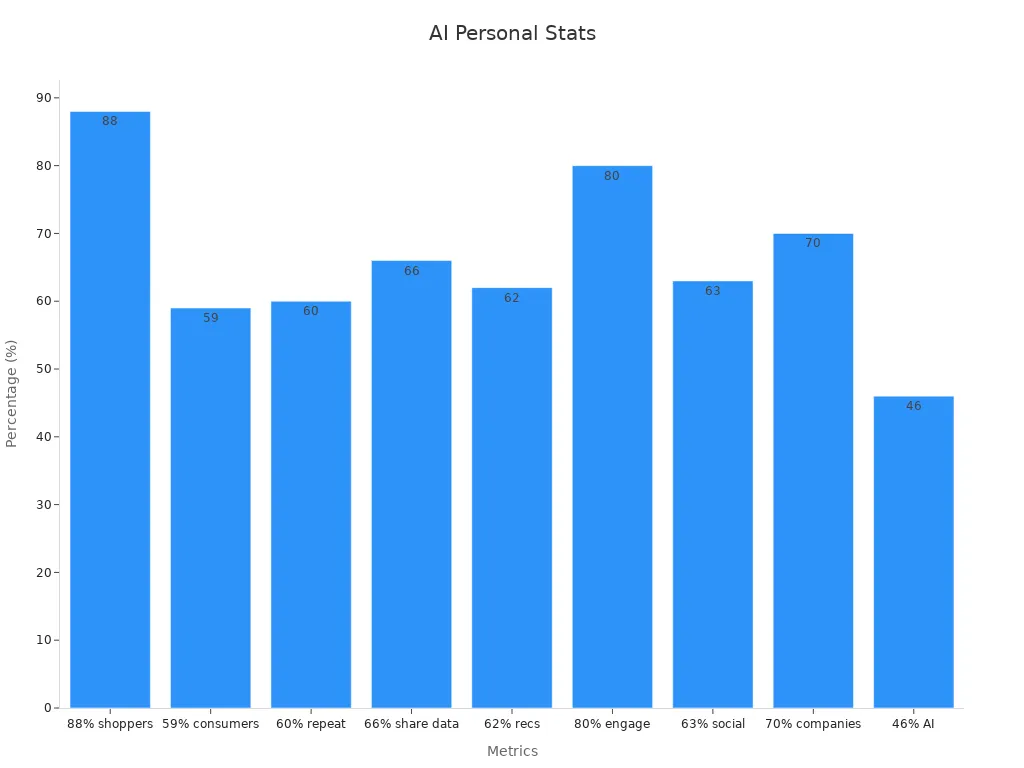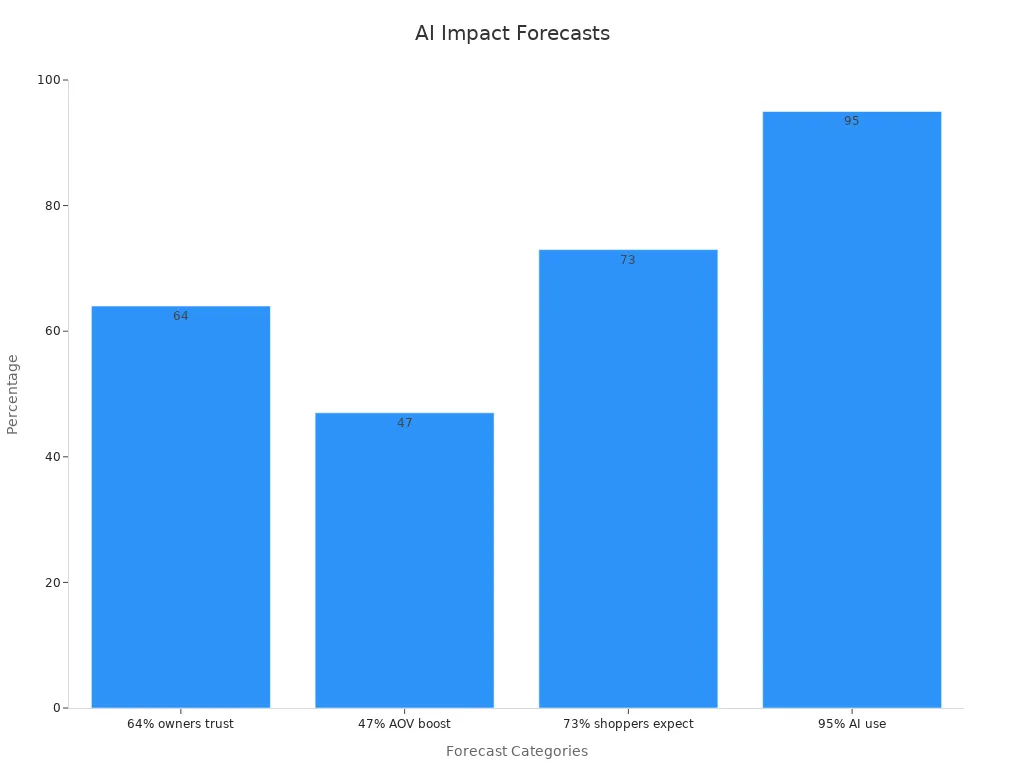
Imagine a world where customer service feels effortless and personalized. AI is making that possible in 2025 by transforming customer service into a faster and more efficient experience. Companies using AI report a 37% drop in first response times and resolve tickets 52% faster, ensuring your concerns are addressed promptly. With AI managing 95% of customer interactions, businesses can offer you seamless support around the clock. This shift isn’t just about speed—it’s about creating meaningful, tailored experiences that enhance your satisfaction and loyalty. AI Customer Service is redefining how businesses connect with you.
Key Takeaways
-
AI is changing customer service by giving quicker replies and custom help, making customers happier.
-
Companies using AI can manage 95% of customer chats, offering nonstop support without waiting.
-
AI tools like chatbots answer simple questions, so workers can solve harder problems, making service better.
-
Predictive tools help businesses guess what customers need, giving early help that builds trust and loyalty.
-
Using AI in customer service makes work faster and helps companies stay successful in a tough market.
Understanding AI in Customer Service
What is AI in customer service?
AI in customer service refers to the use of artificial intelligence to enhance how businesses interact with you. It automates repetitive tasks, provides instant responses, and personalizes your experience. By leveraging advanced algorithms, AI tools can analyze your inquiries, predict your needs, and deliver solutions faster than ever before. Metrics like Average Handling Time (AHT) and Customer Satisfaction (CSAT) are used to measure its effectiveness.
|
Metric |
Description |
|---|---|
|
Average Handling Time (AHT) |
Measures the speed of resolving inquiries, indicating efficiency in customer service. |
|
Response Time |
Tracks how quickly customer inquiries are addressed, impacting customer satisfaction. |
|
Ticket Volume Handled |
Analyzes the number of tickets managed over time, reflecting the efficiency of AI tools. |
|
Resolved on Automation Rate (ROAR) |
Assesses the percentage of inquiries resolved by AI without human intervention, indicating automation effectiveness. |
|
Customer Satisfaction (CSAT) |
Evaluates service quality through customer feedback, ensuring AI meets satisfaction expectations. |
These metrics highlight how AI technology is reshaping customer service to meet your expectations.
The evolution of AI to meet customer needs in 2025
AI has come a long way to meet your growing demands. In the finance sector, AI assistants now handle routine banking inquiries with a 90% ticket deflection rate. This means 9 out of 10 questions are resolved without human help, saving resources and improving efficiency. AI also seamlessly transfers complex issues to human agents, ensuring you get the best support when needed.
By 2025, AI has evolved to offer:
-
Hyper-Personalization: Tailored interactions based on your preferences.
-
Multimodal AI: Support across voice, text, and even visual communication.
-
Generative AI: Advanced tools that create contextually relevant responses, used by 80% of customer service organizations.
This evolution ensures that AI in customer service not only meets but exceeds your expectations.
Key technologies driving AI in customer service
Several cutting-edge technologies power AI in customer service today. Natural Language Processing (NLP) enables AI to understand and respond to your queries in a human-like manner. Generative AI takes this further by crafting personalized and context-aware responses, making your interactions feel seamless. These advancements ensure that AI tools deliver high-quality support while continuously learning from your feedback.
AI technology is no longer just a tool; it’s a game-changer that transforms how businesses connect with you. By integrating these technologies, companies can provide faster, smarter, and more efficient customer service.
Benefits of AI in Customer Service
Personalization for tailored customer experiences
AI has revolutionized how businesses connect with you by delivering personalized customer interactions that feel intuitive and meaningful. Imagine visiting a website where the recommendations align perfectly with your preferences or receiving tailored discounts that make you feel valued. This level of personalization is no longer a luxury—it’s the standard.
|
Statistic |
Source |
|---|---|
|
88% of online shoppers are more likely to continue shopping on a retailer website that offers a personalized experience, including 96% of Gen Zers and 97% of Millennials. |
|
|
60% of consumers report that they will become repeat buyers after a personalized purchasing experience. |
|
|
66% of consumers say they will share personal data about themselves if they think it will elevate their customer experience. |
AI-powered personalization doesn’t just enhance your experience—it builds trust and loyalty. Businesses now use AI to analyze your behavior, preferences, and past interactions to create hyper-personalized recommendations. For example, 62% of consumers agree that personalized recommendations are better than generic ones. This means you’re more likely to find what you need without wasting time.

By leveraging AI, companies can deliver experiences that feel uniquely tailored to you, ensuring your satisfaction and encouraging repeat business.
Efficiency through automation and reduced response times
AI-driven automation has transformed customer service by making it faster and more efficient. Chatbots and virtual assistants now handle routine inquiries, allowing you to get instant answers without waiting in long queues. This efficiency ensures that your time is valued, and your issues are resolved quickly.
-
Purchasing Power reduced live calls by 25% using AI virtual agents, leading to a 17% increase in Net Promoter Score (NPS).
-
Over half of AI-based call centers reported reduced operational costs.
AI tools like chatbots not only save time but also improve the quality of service. They can handle high volumes of inquiries simultaneously, ensuring no customer is left waiting. For instance, 52% of contact centers now use conversational AI, which has significantly reduced response times and boosted customer satisfaction.
Tip: When you interact with an AI-powered chatbot, you’re not just saving time—you’re also contributing to a more efficient customer service ecosystem.
This level of automation ensures that businesses can meet your needs promptly while maintaining high standards of service.
Cost savings and resource optimization
AI doesn’t just improve customer service—it also helps businesses save money. By automating repetitive tasks, companies can allocate resources more effectively. This means fewer costs for handling routine inquiries and more focus on solving complex issues that require human expertise.
|
Report Title |
Key Findings |
|---|---|
|
AI for Customer Service Market |
AI enhances operational efficiency and customer satisfaction through proactive and generative solutions. |
|
The Emerge Haus AI Atlas Report for Contact Centers |
52% of contact centers use conversational AI; AI virtual agents deflected 25% of live calls, improving NPS by 17%. |
|
AI in Customer Service Statistics |
94% productivity boost for CS specialists; 65% report reduced costs due to higher efficiency. |
Companies like Allegro have demonstrated how AI can optimize resources. By integrating machine learning-powered tools, they reduced customer search times and increased transaction values. This approach not only improved efficiency but also enhanced the overall customer experience.
AI’s ability to streamline operations ensures that businesses can scale their services without incurring excessive costs. For you, this translates to better service at a lower price point, making AI a win-win for both customers and companies.
Scalability to support business growth
AI empowers businesses like yours to scale their customer service operations effortlessly. As your company grows, the volume of customer inquiries increases. AI ensures you can handle this surge without compromising service quality. By automating repetitive tasks and streamlining workflows, AI allows your team to focus on more strategic initiatives.
Scalability is not just about managing more inquiries; it’s about doing so efficiently. AI systems adapt to your business needs, ensuring seamless integration with existing processes. For example, AI models evaluate performance on unknown datasets, while system environments assess data quality and integration. These metrics ensure your AI tools remain effective as your business expands.
|
KPI |
Description |
|---|---|
|
AI model |
Assesses AI performance on unknown datasets, focusing on quality index, error rate, and performance. |
|
System environment |
Evaluates data quality, system performance, and integration with data sources for AI effectiveness. |
|
Business value |
Measures success through adaptation rate, user satisfaction, and overall value derived from AI. |
AI technology also supports scalability by providing insights into customer behavior. Predictive analytics help you anticipate trends, allowing you to allocate resources effectively. This ensures your business can grow without the growing pains often associated with scaling customer service operations.
Tip: Scaling your customer service with AI doesn’t just save time—it positions your business for long-term success.
24/7 availability for uninterrupted customer support
Imagine a world where your customers never have to wait for assistance. AI makes this possible by enabling 24/7 customer service. Unlike human agents, AI-powered chatbots and virtual assistants work tirelessly around the clock. They handle routine queries, ensuring your customers always receive timely support.
This constant availability doesn’t just enhance customer satisfaction—it also reduces operational costs. AI eliminates the need for multiple shifts of human staff, allowing you to maintain high service levels with fewer resources. For instance, AI can automate FAQs, freeing up your team to focus on complex issues that require a personal touch.
-
24/7 customer service is highly sought after due to its efficiency.
-
AI chatbots manage routine queries continuously, which is not feasible with human staff alone.
-
This availability allows human agents to concentrate on more complex issues.
By leveraging AI, you can provide uninterrupted support while optimizing your resources. This ensures your customers feel valued, no matter when they reach out. The result? A seamless experience that builds trust and loyalty.
Note: With AI, you’re not just meeting customer expectations—you’re exceeding them.
Practical Applications of AI in Customer Service

Chatbots and virtual assistants for instant responses
AI-driven chatbots and virtual assistants have become indispensable tools in modern customer service. These technologies provide instant responses, ensuring you never have to wait for assistance. Whether you’re asking about a product, troubleshooting an issue, or seeking guidance, chatbots deliver quick and accurate answers. This immediacy not only saves time but also enhances your overall customer experience.
|
Statistic |
Description |
|---|---|
|
74% |
Consumers prefer chatbots for instant answers (PSFK). |
|
83% |
Consumers would use messaging for customer support if guaranteed an immediate response (Helpshift). |
|
77% |
Customers believe chatbots will transform expectations in the next five years (Salesforce). |
AI-powered chatbots excel at handling high volumes of inquiries simultaneously. They ensure no customer is left waiting, even during peak times. For example, when you interact with a chatbot, it uses natural language processing to understand your query and provide a relevant response. This efficiency allows businesses to meet your needs promptly while maintaining high service standards.
Tip: When choosing a service provider, look for companies that use AI-driven chatbots. They guarantee faster resolutions and a smoother experience.
By integrating chatbots into their operations, businesses can reduce response times, improve efficiency, and exceed your expectations.
AI-powered self-service tools for customer empowerment
AI-powered self-service tools put you in control of your customer journey. These tools allow you to find answers, resolve issues, and access information without needing to contact a support agent. Whether it’s a knowledge base, an FAQ section, or an interactive troubleshooting guide, self-service options make it easier for you to get what you need.
-
AI-powered self-service tools streamline data analysis, enabling businesses to quickly derive actionable insights from user data.
-
These tools centralize customer insights, improving interactions and fostering deeper connections.
-
The integration of AI with tools like GA4 enhances data interpretation, allowing businesses to identify user engagement patterns and trends.
-
AI Engagement Analysis processes vast amounts of engagement data, revealing patterns that might otherwise go unnoticed.
-
Timely engagement insights are crucial for enhancing user experiences and informing strategic decisions.
For example, AI technology can predict common issues and proactively offer solutions through automated systems. This minimizes disruptions and ensures you receive timely support. Employee self-service platforms also provide 24/7 accessibility, allowing you to resolve issues at your convenience.
Note: Self-service tools don’t just save time—they empower you to take charge of your customer experience.
By adopting AI-powered self-service tools, businesses can enhance efficiency, improve accessibility, and foster deeper connections with their customers.
Predictive analytics for proactive engagement
Predictive analytics is revolutionizing customer service by enabling businesses to anticipate your needs. Instead of waiting for you to reach out with a problem, companies can use AI to identify potential issues and address them proactively. This approach not only improves your satisfaction but also strengthens your trust in the brand.
-
Proactively resolving issues enhances customer satisfaction.
-
Streamlined ticket categorization reduces response times and improves first-call resolution rates.
-
Predictive analytics can estimate higher ticket volumes during festive sales.
-
It identifies customer segments at risk of canceling subscriptions.
-
Companies using predictive customer support report operational efficiency improvements of 20-30% and a 10-15% increase in customer satisfaction.
For instance, AI tools equipped with natural language processing analyze your language to gauge tone and emotion. Sentiment analysis helps businesses understand how you feel about their products and services, allowing them to address concerns before they escalate.
Tip: Companies that use predictive analytics often provide a more seamless and satisfying customer experience. Look for brands that prioritize this technology.
By leveraging predictive analytics, businesses can stay one step ahead, ensuring you receive proactive and personalized support.
Sentiment analysis for real-time emotional insights
AI has transformed how businesses understand and respond to your emotions during interactions. Sentiment analysis, powered by AI, deciphers the tone and intent behind your words in real time. This technology enables companies to gauge your emotional state, whether you're frustrated, satisfied, or excited, and tailor their responses accordingly. By doing so, businesses can create a more empathetic and personalized customer service experience.
For example, AI-driven sentiment analysis tools analyze text, voice, and even facial expressions to provide actionable insights. These tools help businesses identify patterns in customer feedback, allowing them to address issues proactively. Imagine contacting a support team and having your concerns resolved before they escalate, simply because the system detected frustration in your tone. This level of responsiveness builds trust and strengthens your loyalty.
|
Insight |
Description |
|---|---|
|
Customer satisfaction significantly improves within one year of adoption. |
|
|
67% more accurate market predictions |
Multi-source sentiment analysis enhances trend forecasting. |
|
74% accuracy in feature adoption |
Early sentiment analysis predicts customer behavior effectively. |
|
42% higher engagement |
Sentiment-informed interfaces boost interaction rates and reduce abandonment. |
|
287% ROI over three years |
Sentiment analysis integration delivers substantial financial returns. |
Businesses leveraging sentiment analysis also achieve operational efficiency by identifying opportunities for improvement. Multi-channel analysis, for instance, uncovers hidden trends across platforms, enabling companies to refine their strategies. Real-time sentiment dashboards further enhance efficiency by reducing negative sentiment by 34%, ensuring you always feel heard and valued.
Tip: Companies that use sentiment analysis are better equipped to meet your needs. Look for brands that prioritize emotional intelligence in their customer service.
By integrating sentiment analysis into their operations, businesses can deliver a more empathetic and effective service, ensuring your satisfaction at every touchpoint.
AI tools for enhancing agent productivity
AI doesn’t just improve customer interactions—it also empowers customer service agents to perform at their best. By automating repetitive tasks and providing real-time insights, AI tools free up agents to focus on complex issues that require a human touch. This enhanced efficiency ensures you receive faster and more accurate support.
For instance, AI-powered systems assist agents by suggesting relevant solutions during live interactions. These tools analyze your query, retrieve the most suitable information, and present it to the agent instantly. This reduces response times and improves the quality of service. Companies like Telstra have reported a 20% reduction in follow-up calls, with 84% of agents saying AI positively impacts their interactions with customers.
|
Company |
Metrics/Results |
Quote |
|---|---|---|
|
Telstra |
20% less follow-up on calls, 84% of agents said it positively impacted interactions, 90% of agents are more effective |
“Agents are happy that they’re confident in their ability to support our customers more effectively.” |
|
ClickUp |
25% increase in rep solves per hour, improved support efficiency, reduced onboarding time |
“With increased efficiency on reactive operational support, we can invest more heavily in proactive retention activities.” |
|
Motel Rocks |
43% of tickets deflected by AI, 50% reduction in ticket volume, 9.44% increase in customer satisfaction |
“There’s just more information on the screen for agents to see straight away.” |
|
Camping World |
40% increase in customer engagement, 33-second drop in wait times, 33% increase in agent efficiency |
“The agents love the ease with which they can interact with the customers.” |
AI tools also enhance productivity by streamlining workflows. For example, predictive analytics can categorize tickets automatically, ensuring they reach the right agent without delay. This reduces average handling times and allows agents to resolve more inquiries in less time. Additionally, AI-driven training platforms help new agents onboard 50% faster, equipping them with the skills they need to succeed.
Note: When businesses invest in AI tools, they’re not just improving their operations—they’re ensuring you receive the best possible service.
By adopting AI technology, companies can empower their agents to work smarter, not harder. This results in a seamless customer service experience that leaves you feeling valued and supported.
The Impact of AI on Businesses and Customers
How businesses are leveraging AI to stay competitive
AI has become a cornerstone for businesses aiming to stay ahead in today’s fast-paced market. By integrating AI into customer service operations, companies can streamline processes, reduce costs, and deliver exceptional experiences. For instance, 45% of businesses have adopted AI in their customer service strategies, with 75% reporting significant improvements in customer satisfaction. Chatbots alone are projected to save businesses over $8 billion annually by 2026, highlighting their transformative potential.
Companies are also using AI-driven analytics to uncover new opportunities. For example:
|
Company |
AI Application |
Result |
|---|---|---|
|
Company B |
AI-driven analytics for customer support |
15% increase in upselling opportunities |
|
Company C |
Personalized AI interactions |
35% improvement in customer retention rates |
These advancements allow businesses to predict customer needs, personalize interactions, and foster loyalty. By leveraging AI, companies not only enhance their competitiveness but also position themselves as leaders in innovation.
Enhancing customer satisfaction and loyalty with AI
AI is redefining how businesses connect with you, ensuring your satisfaction and loyalty. By automating routine tasks and personalizing interactions, AI creates seamless experiences that leave a lasting impression. Tools like chatbots provide instant responses, while machine learning algorithms analyze your preferences to offer tailored recommendations. This combination of speed and personalization builds trust and encourages repeat business.
AI also improves service quality by enabling real-time analysis of customer interactions. For example, AI systems can detect patterns in your behavior and proactively address potential issues. This ensures you feel valued and understood, which is crucial for fostering loyalty. Studies show that the quality of AI-powered chatbot services positively influences customer loyalty through satisfaction and trust. Businesses that prioritize these technologies consistently outperform competitors in retaining customers.
Addressing challenges and ethical considerations in AI adoption
While AI offers immense benefits, its adoption comes with challenges and ethical concerns. One major issue is the risk of bias in AI systems. Research by Celeste Kidd, PhD, highlights how AI can inherit biases from assumptions about its capabilities, potentially leading to unfair outcomes. Additionally, studies by Shoss & Vicente reveal that AI errors can influence human decision-making, further complicating its implementation.
|
Study/Research |
Findings |
Source |
|---|---|---|
|
Mindy Shoss, PhD |
People in unequal societies perceive AI as a job threat |
|
|
Behrend & Landers |
||
|
Celeste Kidd, PhD |
Risks of inheriting biases from AI |
To address these challenges, businesses must implement robust ethical guidelines and conduct regular audits of their AI systems. Transparency in AI decision-making processes is also essential to build trust with customers. By tackling these issues head-on, companies can ensure that AI adoption benefits everyone while minimizing potential risks.
The Future of AI in Customer Service

Emerging trends in AI technology for customer service
AI is advancing rapidly, and its influence on customer service continues to grow. By 2025, nearly 80% of customer service organizations are expected to implement generative AI to enhance their operations. This technology enables businesses to deliver faster, more accurate, and context-aware solutions. For example, AI systems can analyze vast amounts of data in seconds, identifying patterns and providing actionable insights. This capability empowers companies to predict customer needs and offer proactive support.
Emerging trends also include intuitive self-service options. AI now enables customers to resolve queries independently through advanced chatbots and interactive tools. These systems not only save time but also reduce employee burnout by automating routine tasks. Additionally, AI acts as a strategic force multiplier, processing millions of possibilities to identify correlations and improve decision-making. As customer expectations rise, businesses are adopting these innovations to stay competitive and deliver exceptional service.
Hyper-personalized customer experiences through AI
Hyper-personalization is redefining how businesses interact with you. AI algorithms analyze your preferences, purchase history, and browsing behavior to create tailored experiences. Companies like Stitch Fix and Wayfair already use AI to recommend products that align perfectly with your tastes. In the travel industry, AI personalizes itineraries based on your interests, ensuring every trip feels unique.
Future advancements will take personalization even further. AI will gain emotional intelligence, allowing it to understand your mood and respond empathetically. Contextual awareness will also improve, enabling AI to consider situational factors when offering solutions. For example, streaming platforms will recommend content based on your current emotional state, enhancing your viewing experience. These innovations will foster deeper connections between you and the brands you trust.
The long-term impact of AI on the customer service landscape
AI is set to revolutionize customer service in the long term. By 2025, it will power 95% of customer interactions, transforming how businesses engage with you. Companies that invest in AI will see significant benefits, including increased revenue and stronger customer relationships. For instance, AI can boost average order value by 47% and improve customer satisfaction by addressing issues proactively.
The financial impact is equally impressive. Businesses with excellent customer experiences grow revenues 4%-8% faster than their competitors. AI’s ability to deliver seamless, personalized service will play a key role in achieving this growth. However, as AI adoption increases, companies must address challenges like data security and ethical concerns to maintain trust. The future of AI in customer service is bright, but its success depends on responsible implementation.

AI is transforming customer service in 2025, delivering faster, more personalized, and efficient support that meets your expectations. Businesses are using AI to automate workflows, enhance human capabilities, and improve productivity. For example:
|
Finding |
Description |
|---|---|
|
Productivity Improvement |
Customer support agents using AI assistants are 14% more productive. |
|
Automation of Tasks |
AI chatbots handle common inquiries, streamlining customer service operations. |
|
Enhancement of Human Capabilities |
AI collaboration allows agents to focus on complex queries, improving performance. |
AI technologies also elevate your experience through real-time assistance and tailored recommendations. Chatbots reduce waiting times, ensuring you receive prompt service. Predictive systems anticipate your preferences, creating personalized interactions that foster loyalty.
Tip: Embracing AI isn’t just about keeping up—it’s about staying ahead. Businesses that adopt AI will lead the way in delivering exceptional customer service.
As AI continues to advance, its role in shaping the future of customer service will grow. Companies that embrace its potential will thrive in a competitive market, ensuring you always receive the best support.
FAQ
What makes AI better than traditional customer service methods?
AI delivers faster responses, personalized solutions, and 24/7 availability. Unlike traditional methods, it handles high volumes of inquiries without delays. You get instant answers and tailored recommendations, improving your experience. Businesses also save costs, ensuring better service at competitive prices.
Tip: Choose companies using AI for a seamless and efficient support experience.
Can AI completely replace human customer service agents?
No, AI complements human agents by handling repetitive tasks and providing instant support. For complex issues, human agents step in to offer empathy and expertise. This collaboration ensures you receive the best of both worlds—speed and personalization.
How does AI ensure my data stays secure?
AI systems follow strict security protocols to protect your data. Encryption, anonymization, and regular audits ensure your information remains safe. Reputable companies prioritize transparency and comply with data protection laws, giving you peace of mind.
Note: Always check a company’s privacy policy before sharing personal information.
Will AI-powered customer service work for all industries?
Yes, AI adapts to various industries, from retail to healthcare. It personalizes experiences, predicts needs, and resolves issues efficiently. Whether you’re shopping online or booking a doctor’s appointment, AI enhances your journey.
How can I tell if a company uses AI in customer service?
Look for features like chatbots, instant responses, and personalized recommendations. Companies using AI often highlight these benefits on their websites. You’ll notice faster resolutions and tailored interactions, making your experience smoother.
Emoji Insight: 🧠 AI = Smarter, faster, better service!








